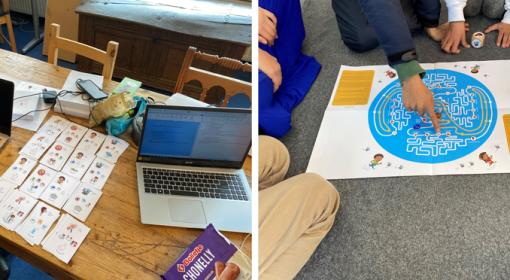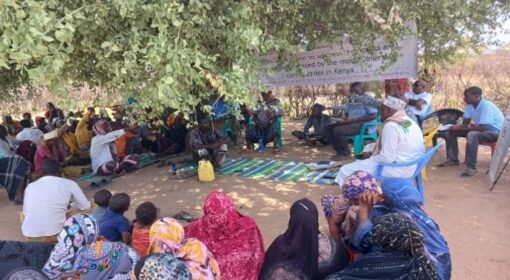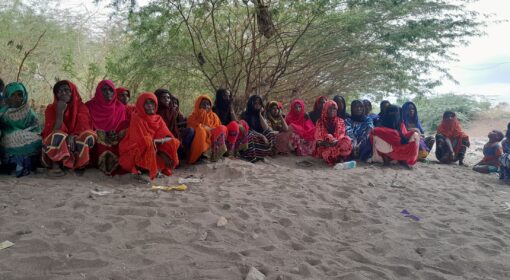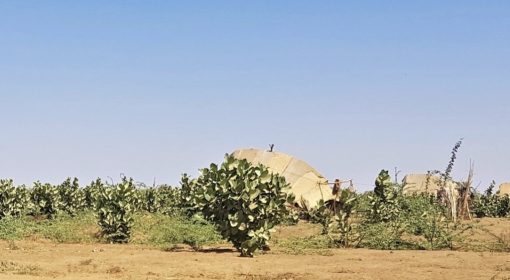By MID-P, hub in the Reversing the Flow program
This blog is part of a dossier on locally-led adaptation, featuring insights and lessons from the Reversing the Flow (RtF) program. RtF empowers communities in Bangladesh, Burkina Faso, Ethiopia, Kenya, and Sudan to build climate resilience through direct funding and a community-driven, landscape approach.
In the arid landscapes and rugged terrains of the Merti area of Isiolo county, Kenya, the delicate balance of life is constantly tested by the unforgiving and extreme weather. Here, local communities have grappled with the harsh reality of the dire drought of 2022 and the destructive floods of 2023 enduring a relentless cycle of loss and devastation.
Households have lost their livestock, a prized possession and source of sustenance and wealth, to the harsh drought and the remaining ones lost in the unforgiving floods. As if this devastation was not enough, the heavy rains and flash floods in late 2023, led to the destruction of essential infrastructure like roads and latrines, grazing lands and further increased incidences of water-borne diseases like cholera, malaria and the massive displacement of populations.
The impact of climate change reaches far beyond the loss of livelihoods and damage to infrastructure. It extends into the heart of education, disrupting the process of learning and compromising the quality of education that the children of Merti receive. Drought means that children miss school due to families moving in search of pasture. Even if they get to attend school, concentration is impossible on an empty stomach.
Floods left behind a trail of devastation, classrooms were destroyed, latrines submerged and families displaced. In Merti South Muslim primary, the latrines collapsed compromising the health and hygiene of the pupils and their teachers. A stone throw away is Gamachu Primary school, whose water pipes were damaged by the floods. Now the school does not have access to clean and safe water for the pupils and teachers. The fully equipped dormitory in the school cannot be used because of the lack of water.
Amidst the chaos and destruction, a glimmer of hope emerges forged by the determination of communities to recover from the dire impacts of the changing climate. Under the Loss and Damage project, funded by the Scottish Government through Oxfam in Kenya, local organisation MID-P facilitated the disbursement of group cash grants in the area.
The objective of this initiative is to build the capacity of local actors in supporting community-led emergency response to the effects of climate change loss and damage through group cash grants. Community groups receive cash to implement projects of their choice that will benefit the local community.
In the Merti area, the Merti Women Crusher group and the Bash Women group are two of the ten groups that have received and implemented this grant. For Rukia Hassan, Chairlady of the Merti Women Crusher group, the mission is clear, “There are many challenges due to the drought and the floods. Our group prioritised the village school going children”.
Every morning as the sun rises in the Merti area of Isiolo county, school children walk on the dusty paths from their homes to school. On one hand are their school bags and on the other hand is a 5-litre jerrycan with water. These jerrycans are a requirement for them to attend school and each carries a precious resource needed to cook their lunch in school. The water crisis and drought in the area means that every child must contribute a jerrycan of water daily to ensure that there is enough to cook their lunch time meal.
Once they get to school, their first stop is the school makeshift kitchen where they all deliver their water and run off to their classrooms to begin their studies. For some children, school provides the assurance of a meal and an education that will hopefully give them a better future. After they have had their lunch, the children are allowed to walk into the neighboring homesteads to look for drinking water.
“Access to clean and safe water is our main challenge in Gamachu Primary school. We cannot control the quality of water that the children bring, exposing the school to water borne diseases”, explains Hassan Galgalo, the Headteacher of the school.
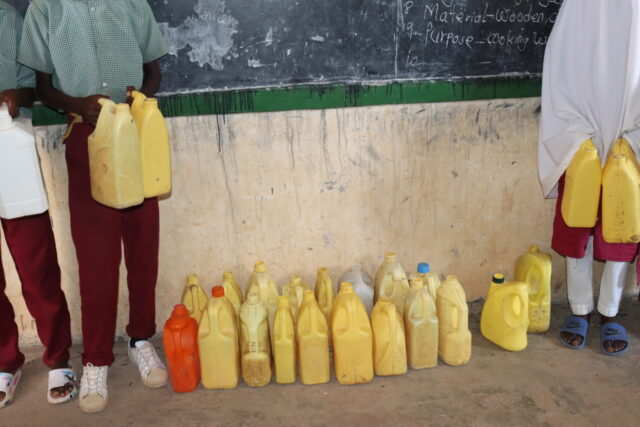
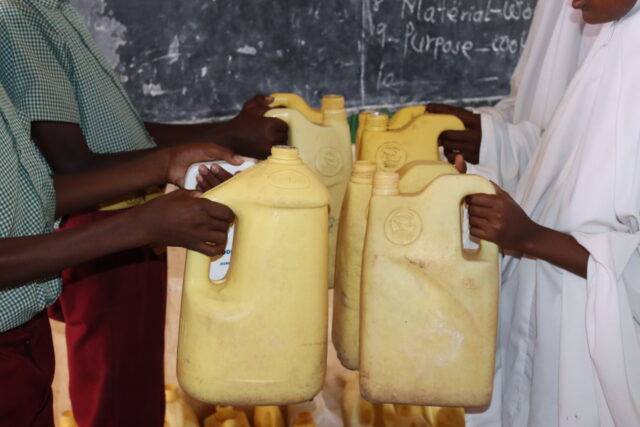
Bash Bash women group have constructed a pipeline from the borehole to the school that caters for 419 pupils plus their teachers and other staff members.
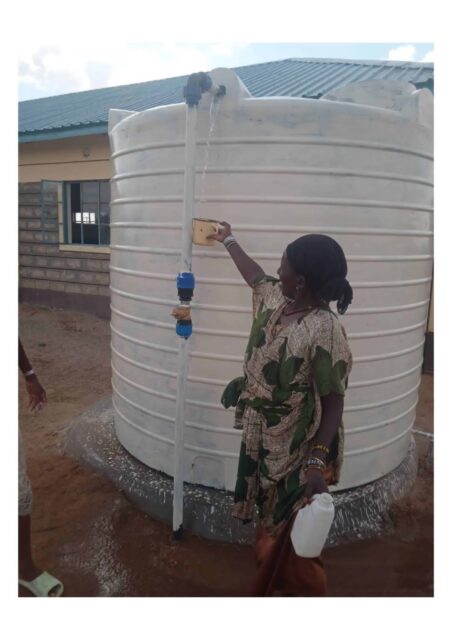

“The school is located in one of the most vulnerable villages in Merti, and some of the pupils even stopped coming to school due to lack of food and water. Now that we have water in the school, the dormitory will be open, pupils will get food from school and will now focus on their studies” says Mr. Hassan Galgalo, headteacher, Gamachu Primary school.
Construction of latrines for pupils
In the heart of Merti South Muslim primary is a block of latrines that have for years provided a semblance of hygiene and sanitation to the pupils and their teachers. One evening the rains fell relentlessly flooding the land and wreaking havoc upon everything on its path. Roads became impassable, homes and cattle were swept away. Among the casualties of the flood was the school latrine whose walls caved in and its roof collapsed under the weight of the flood water.
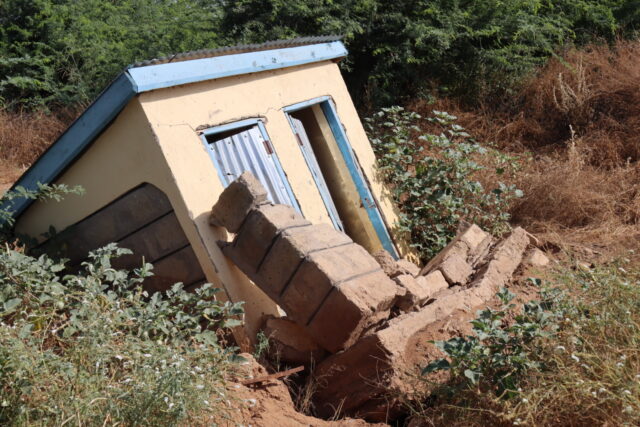
“Rebuilding this latrine was essential to ensure the health and dignity of the pupils was maintained”, (quote from one of the group members)
Merti Women Crushers self-help group chose to rebuild the collapsed latrines with their ground cash grant. This not only restored the vital infrastructure but enhanced their belief in the importance of the health and sanitation of the pupils and they pursued their education.


Community-led initiatives recognize local foundations and a collaborative approach which enhances impact and sustainability. Supporting Community-Led Response (SCLR) empowers local communities to be proactive agents of their own development. This holistic and participative approach leads to more sustainable and impactful response and resilience projects ultimately to the benefit of the greater community.

